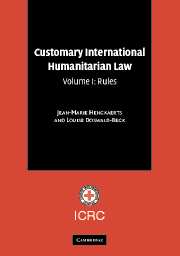Book contents
- Frontmatter
- Contents
- Foreword by ICRC President Jakob Kellenberger
- Foreword by Judge Abdul G. Koroma
- Foreword by Yves Sandoz
- Acknowledgements
- Introduction
- List of abbreviations
- Part I The Principle of Distinction
- Part II Specifically Protected Persons and Objects
- Part III Specific Methods of Warfare
- Part IV Weapons
- Chapter 20 General Principles on the Use of Weapons (Rules 70–71)
- Chapter 21 Poison (Rule 72)
- Chapter 22 Nuclear Weapons
- Chapter 23 Biological Weapons (Rule 73)
- Chapter 24 Chemical Weapons (Rules 74–76)
- Chapter 25 Expanding Bullets (Rule 77)
- Chapter 26 Exploding Bullets (Rule 78)
- Chapter 27 Weapons Primarily Injuring by Non-detectable Fragments (Rule 79)
- Chapter 28 Booby-traps (Rule 80)
- Chapter 29 Landmines (Rules 81–83)
- Chapter 30 Incendiary Weapons (Rules 84–85)
- Chapter 31 Blinding Laser Weapons (Rule 86)
- Part V Treatment of Civilians and Persons Hors De Combat
- Part VI Implementation
Chapter 20 - General Principles on the Use of Weapons (Rules 70–71)
Published online by Cambridge University Press: 05 June 2012
- Frontmatter
- Contents
- Foreword by ICRC President Jakob Kellenberger
- Foreword by Judge Abdul G. Koroma
- Foreword by Yves Sandoz
- Acknowledgements
- Introduction
- List of abbreviations
- Part I The Principle of Distinction
- Part II Specifically Protected Persons and Objects
- Part III Specific Methods of Warfare
- Part IV Weapons
- Chapter 20 General Principles on the Use of Weapons (Rules 70–71)
- Chapter 21 Poison (Rule 72)
- Chapter 22 Nuclear Weapons
- Chapter 23 Biological Weapons (Rule 73)
- Chapter 24 Chemical Weapons (Rules 74–76)
- Chapter 25 Expanding Bullets (Rule 77)
- Chapter 26 Exploding Bullets (Rule 78)
- Chapter 27 Weapons Primarily Injuring by Non-detectable Fragments (Rule 79)
- Chapter 28 Booby-traps (Rule 80)
- Chapter 29 Landmines (Rules 81–83)
- Chapter 30 Incendiary Weapons (Rules 84–85)
- Chapter 31 Blinding Laser Weapons (Rule 86)
- Part V Treatment of Civilians and Persons Hors De Combat
- Part VI Implementation
Summary
Rule 70. The use of means and methods of warfare which are of a nature to cause superfluous injury or unnecessary suffering is prohibited.
Practice
Volume II, Chapter 20, Section A.
Summary
State practice establishes this rule as a norm of customary international law applicable in both international and non-international armed conflicts.
International armed conflicts
The prohibition of the use of means and methods of warfare which are of a nature to cause superfluous injury or unnecessary suffering is set forth in a large number of treaties, including early instruments such as the St. Petersburg Declaration and the Hague Declarations and Regulations. The prohibition on the use of chemical and biological weapons in the Geneva Gas Protocol was originally motivated by this rule. Its reaffirmation in recent treaties, in particular Additional Protocol I, the Convention on Certain Conventional Weapons and its Protocol II and Amended Protocol II, the Ottawa Convention banning anti-personnel landmines and the Statute of the International Criminal Court, indicates that it remains valid. The rule is also included in other instruments.
Numerous military manuals include the rule. Sweden's IHL Manual, in particular, identifies the prohibition of means and methods of warfare which cause superfluous injury or unnecessary suffering, as set forth in Article 35(2) of Additional Protocol I, as a rule of customary international law. Violations of this rule constitute an offence under the legislation of many States. It has been relied upon in national case-law.
- Type
- Chapter
- Information
- Customary International Humanitarian Law , pp. 237 - 250Publisher: Cambridge University PressPrint publication year: 2005
- 2
- Cited by



